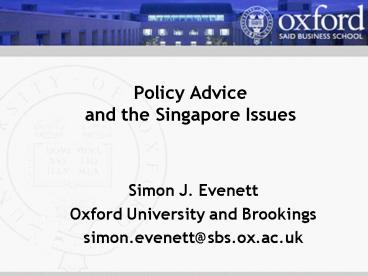Policy Advice and the Singapore Issues - PowerPoint PPT Presentation
1 / 15
Title:
Policy Advice and the Singapore Issues
Description:
Cancun Ministerial Declaration in 2003. December 15th 2003 'deadline. ... Despite the Cancun Ministerial, demand for advice on Singapore Issues is likely ... – PowerPoint PPT presentation
Number of Views:62
Avg rating:3.0/5.0
Title: Policy Advice and the Singapore Issues
1
Policy Advice and the Singapore Issues
- Simon J. Evenett
- Oxford University and Brookings
- simon.evenett_at_sbs.ox.ac.uk
2
Objectives of this presentation
- Brief description of the four Singapore Issues.
- Summary of views about them.
- Presentation of a neutral means of assessing the
case for including such issues in trade
agreements. - Discuss implications for regional as well as
multilateral trade negotiations.
3
What are the Singapore Issues?
- Investment.
- Competition law.
- Transparency in government procurement.
- Trade facilitation.
4
WTO discussions on the Singapore Issues
- Singapore Ministerial Declaration in 1996.
- Creation of Working Groups.
- Doha Ministerial Declaration in 2001.
- Modalities.
- Timing of decisions.
- Cancun Ministerial Declaration in 2003.
- December 15th 2003 deadline.
5
Often-heard arguments pro and con
- Pro
- Complementarities with trade reform and other
reforms. - Preserving the existing bargain.
- Rules would be of distinct intrinsic value.
6
Often-heard arguments pro and con
- Pro
- Complementarities with trade reform and other
reforms. - Preserving the existing bargain.
- Rules would be of distinct intrinsic value.
- Con
- Generic concerns about the WTO
7
Often-heard arguments pro and con
- Pro
- Complementarities with trade reform and other
reforms. - Preserving the existing bargain.
- Rules would be of distinct intrinsic value.
- Con
- Generic concerns about the WTO
- Mission creep.
- Grievances about Uruguay Round.
- DSU.
8
Often-heard arguments pro and con
- Pro
- Complementarities with trade reform and other
reforms. - Preserving the existing bargain.
- Rules would be of distinct intrinsic value.
- Con
- Generic concerns about the WTO.
- Case for collective action at the WTO.
- Market access only.
9
Often-heard arguments pro and con
- Pro
- Complementarities with trade reform and other
reforms. - Preserving the existing bargain.
- Rules would be of distinct intrinsic value.
- Con
- Generic concerns about the WTO.
- Case for collective action at the WTO.
- Costs and benefits of implementation.
- Analogy to SPS and TRIPS agreements.
10
Often-heard arguments pro and con
- Pro
- Complementarities with trade reform and other
reforms. - Preserving the existing bargain.
- Rules would be of distinct intrinsic value.
- Con
- Generic concerns about the WTO.
- Case for collective action at the WTO.
- Costs and benefits of implementation.
- Constraining policy space.
11
Deeper questions raised by Singapore Issues
- What are the boundaries of the WTO?
- Should it be confined to market access issues?
- Membership and content of future agreements.
- To what extent have the benefits of prior reforms
depended on presence or absence of complementary
policies? - What economic and political-economy factors
motivate international collective action in these
four areas?
12
Guiding principles for good policy advice on the
Singapore Issues
- Understanding the policy proposals is critical
few bother to read the relevant proposals and
many mischaracterize what is on the negotiating
table. - Even though there is little empirical research on
these issues, an over-reliance on first
principles is unhealthy. - Country heterogeneity mitigates against sweeping
conclusions be suspicious of them.
13
A step-by-step approach to analyses of the
Singapore Issues
- 1. What is the key development issue at stake?
(This is not necessarily the key negotiating
issue). - 2. What rationale, if any, is there for different
types of international collective action (ICA) in
a given policy arena? - Cross-border spillovers and externalities.
- Political economy of reciprocal reform.
- 3. From an economic perspective, which type of
ICA is preferable?
14
A step-by-step approach to analyses of the
Singapore Issues
- 4. What is the economic case for undertaking the
preferred type of ICA in the WTO? - 5. What proposals have actually been advanced in
this policy area at the WTO? - 6. How do those proposals stack against the
arguments advanced in 2.-4. above? - 7. Are there other initiatives in this policy
area that might better advance development than
those currently proposed at the WTO?
15
Implications for Bank policy advice
- Despite the Cancun Ministerial, demand for advice
on Singapore Issues is likely to be high given
their inclusion in many preferential trade
negotiations. - An inadequate research base, plus variation in
country circumstances, will limit the amount of
papers that are directly relevant to the country
that you are responsible for. - Beware of generic policy conclusions.
16
Implications for Bank policy advice
- However, all is not lost.
- Hopefully this presentation has demonstrated that
there is a neutral step-by-step method for
assessing proposals for the Singapore Issues. - Even though weve talked a lot about trade
negotiations, dont forget that countries can
unilaterally reform.































